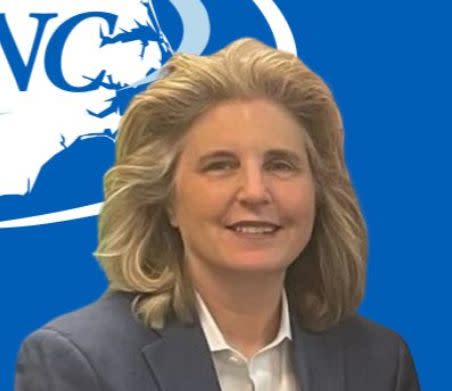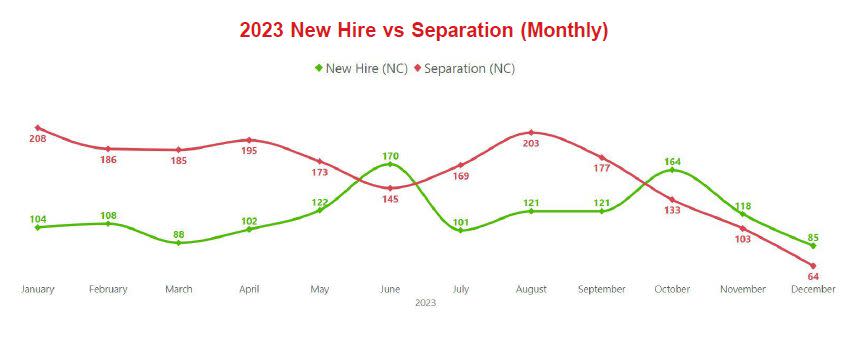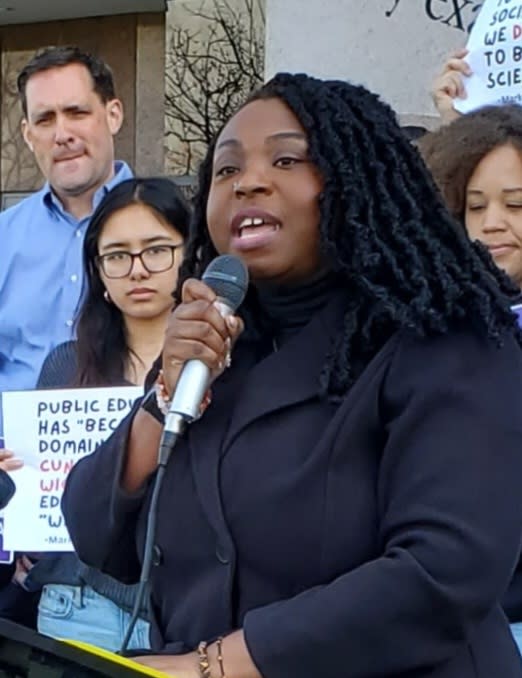NC’s legislative “short session” comes with a long to-do list

Members of the NC House and Senate convene April 24th for the 2024 legislative session. (Photo: Clayton Henkel)
Members of the North Carolina House and Senate return to Raleigh next Wednesday, April 24th for the 2024 legislative “short session,” and it may well be one that’s defined by three P’s: people, pay, and persistence.
For weeks now, legislative committees have been hearing about state agency needs, and a recurring theme is the critical shortages of workers.
PEOPLE
Mark Benton, chief deputy secretary for health with the state Department of Health and Human Services, told lawmakers earlier this month that while there has been some improvement in state pay over the past year, wages simply aren’t competitive with the private sector.
SEANC Executive Director Ardis Watkins (Courtesy photo)
At the state’s three psychiatric hospitals, hundreds of positions remain unfilled. Benton said the vacancy rate at Morganton’s Broughton Hospital is 32%, at Central Regional Hospital in Butner it’s 32% and Cherry Hospital in Goldsboro 24% of its positions are unstaffed.
The shortage of state workers in those facilities can mean delays in getting care, but it also leads to burnout for workers doing their own jobs, plus the work of others when a position remains open for months.
“They’re working themselves to death,” said Ardis Watkins, executive director of the State Employees Association of North Carolina (SEANC), in an interview with NC Newsline.
“And the problem is in our facilities, our institutions, they’re caring for some of the most vulnerable in our population. And that’s not what you want. You don’t want people who are overworked, overburdened, and who eventually start to grow resentful of that because they feel like nobody’s hearing them.”
Source: NC Department of Adult Correction
Watkins says the situation is just as dire at the state Department of Public Safety where some prisons are coping with a 60% vacancy rate.
Todd Ishee, secretary of the Department of Adult Correction, said his agency is hiring people faster than employees are quitting, but 39% of correctional officer jobs in North Carolina prisons are vacant.
His department completed 620 hiring events last year statewide, hoping to attract more to their ranks.
And while it has received far less attention, the North Carolina Clerks of Superior Court are requesting funding for more than 200 positions in the 2024-25 FY budget.
As the Administrative Office of the Courts presses forward with the rollout of the $100 million eCourts System, clerks are faced with maintaining the legacy system while mastering the intricacies of the new technology, which remains a work in progress.
“The 219 needed positions are based on our standard workload formula, and that is based on the filings in our counties, “Johnston County Clerk of Superior Court Michelle Ball told lawmakers in a recent hearing.
“I believe we will need more positions in the eCourts rollout as we go forward, but it’s very hard to say because we don’t have enough people to do the work we were doing before without lots of stresses to our staff.”
PAY
Teachers are also under more stress.
State budget writers are quick to tout raises that came in last year’s budget, though educators note that those raises aren’t keeping up with the cost of living.
Tamika Walker Kelly, NCAE (Photo: Clayton Henkel)
Tamika Walker Kelly, president of the NC Association of Educators, suggests looking at the other southern states to assess how teachers are doing in the Tar Heel state.
“We are now lagging behind some of the people that we used to brag about being better than. We are no longer in competition with places like Alabama, or Mississippi, we are behind them,” Walker Kelly said in a recent interview with Newsline.
The state Department of Public Instruction notes that, like prisons, schools are hiring more teachers than they are losing, but the teacher attrition rate was 11.5% for the 2022-23 school year, with beginning teachers (in the first three years of their career) most likely to leave the profession.
Walker Kelly agrees the novice teachers need more support, but she doesn’t want legislators to forget about North Carolina’s most seasoned instructors when it comes to compensation.
“Our veteran educators are some of the most dedicated members of our profession. They serve as mentors in our schools. They are rocks of school communities and their salaries have essentially been frozen once you get past year 15,” she said. “I’m in my 17th year of education and that range from 15 to the top of the pay skill — they see less than 1% of a salary increase, which equates to …maybe just a single tank of gas for the time and effort and skill set that they put into educating the children of our state.”
Any raises for public school teachers appear likely to be modest.
House Speaker Tim Moore has indicated that he would like another $300 million earmarked this session for private school vouchers.
Nearly 72,000 families applied for the Opportunity Scholarship after legislators in the last session removed all income eligibility requirements – effectively allowing even affluent families to take those funds to private or religious schools.
PERSISTENCE
Child care
For thousands of North Carolina childcare centers, the legislative session is all about persistence.
For months now the industry has been working to raise awareness of the looming “childcare cliff.” Child Care Stabilization Grants that were established with American Rescue Plan Act (ARPA) funding, allowed North Carolina’s 5,400 childcare programs to recruit and retain employees during the pandemic. By increasing staff salaries and providing benefits, centers were able to maintain their staffs. That meant parents could go back to their own jobs. But the stabilization grants expire on June 30th.
Childcare centers are facing a financial cliff when stabilization grants expire June 30, 2024. (Photo: SDI Productions/ Getty Image)
A survey conducted by the North Carolina Child Care Resource and Referral Council (CCR&R) found that without financial assistance from the state legislature, nearly 30% of North Carolina’s childcare centers expect to close. Centers that don’t shutter anticipate they could raise the fees charged to parents 13 to 17%.
Rhonda Rivers, regional director of education for LeafSpring Schools in Charlotte, says the irony is that many of their childcare workforce used that initial bump in pay to cover the cost of care for their own children.
But in a tight labor market, it’s unlikely workers will be willing to stay and take a pay cut when the federal funds sunset. She’s asked the parents her center serves to call legislators to help make the case for continuing the stabilization grants.
“We all have a responsibility here. This isn’t a want. This is an absolute need,” Rivers told Newsline.
Elections
Another believer in persistent messaging is Karen Brinson Bell. The executive director of the North Carolina State Board of Elections was back before the Joint Legislative Elections Oversight Committee on Wednesday.
With many lawmakers claiming to be laser-focused on election security ahead of November’s General Election, Brinson Bell reminded committee members that when North Carolina developed its statewide voter registration system in 1998, the state was at the national forefront.
But the State Election Information Management System (SEIMS) has 13 layered modules – handling everything from candidate filing to processing absentee ballots — and is showing its age. The State Board of Elections is pushing for modernization of the system that would allow for new coding and more user-friendly platforms.
“If you look at our system, it looks like you’re looking at Atari in a day and age when we have smartphones,” said Brinson-Bell, referencing the 70s-era home video gaming console.
The State Board of Elections needs $8 million to modernize SEIMS but it received $5 million.
“We’ve got an old house that needs to be refurbished, and we are very appreciative, you gave us the bulk of the money,” said Brinson-Bell. “We’ll get the foundation and the walls, [but] we need the roof. That’s where we are.”
How these priorities stack-up will largely depend on legislative leadership and the budget chairs in the Republican-controlled General Assembly.
Speaker Tim Moore, who is running for Congress in North Carolina’s 14th district, told reporters earlier this month that his intention was to keep the ’24 session brief.
“When we come in for short session…it’s going to be the short session.”
For a list of bills eligible for consideration during the 2024 Session, click here.
The post NC’s legislative “short session” comes with a long to-do list appeared first on NC Newsline.





